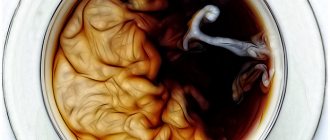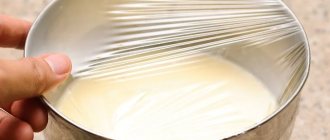…for breakfast
— I don’t recommend drinking strong, undiluted coffee on an empty stomach - it’s hard for the morning, and you may feel discomfort. Coffee has a very active effect on many digestive processes. The best “morning” drink, in my opinion, is cappuccino. This is what Russian “coffee lovers” most often drink in the morning. And don't forget the snack! A cappuccino and croissant is a great start to the day. And although at its core it is coffee with milk, this drink is unique. The pleasant feeling left after a cappuccino will not be given to you by any other drink. The lower lip touches the warm edge of the cup, and the upper lip touches the delicate coffee and milk foam... And people are enchanted by the cappuccino.
Coffee may improve exercise performance
Coffee is known for its ability to promote wakefulness and alertness, but the drink is also an effective exercise enhancer thanks to its caffeine content.
Additionally, coffee can be a much cheaper alternative to caffeine-containing supplements such as pre-workout powders.
Several studies have shown that caffeine can delay exercise fatigue and improve muscle strength (, ).
While it may not make a significant difference whether you decide to drink coffee when you wake up or a few hours later, the effect of caffeine from coffee on exercise performance is time dependent.
If you want to optimize the benefits of coffee on performance, it is best to drink the drink 30-60 minutes before your workout or sporting event (). This is the time it takes for caffeine to reach its peak in your body ().
An effective dose of caffeine for improving exercise performance is 1.4–2.7 mg per pound (3–6 mg per kg) of body weight ().
For a 68 kg person, this is approximately 200–400 mg of caffeine or 2–4 cups (475–950 ml) of coffee ().
The caffeine benefits of coffee can be achieved 30 to 60 minutes after drinking the drink.
…for dinner
— Espresso is good after dinner. Espresso is generally recognized as one of the best digestifs (drinks that are served at the end of a meal and contribute to its better absorption. - Editor's note). You ate too much - drank espresso - sleep well! At home, again, you can drink a big cup of coffee: filter coffee, etc.
In Russia, it is more common to drink tea after dinner, since Russia is still considered a “tea” country. But residents of “coffee” countries (for example, Italians) drink coffee from early morning until late at night. They drink in the morning to wake up, and late at night - after a noisy and long dinner - to sleep better. But coffee is even more popular in Scandinavian countries. And the people here look good, they have a normal complexion, and so on... This is about the harm or benefit of coffee.
LiveInternetLiveInternet
Over the millennia of mankind’s acquaintance with this drink, a lot has been said about coffee and at the same time almost nothing.
The mechanism of its invigorating effect on the psyche, the degree of usefulness and the level of harmfulness are still unknown. We still don’t know how and when to drink coffee, how much coffee to drink in order to get maximum pleasure from it and not ruin our health with caffeine.
Is it possible to drink coffee on an empty stomach?
There are dangers from morning coffee, as well as the threat of excess caffeine in the body from excessive consumption. Although not proven. After all, no one shouts that tea is harmful, but it sometimes contains even more caffeine than some types of coffee!
This is where the first mistake of coffee lovers lies, which we do not take seriously. First, the caffeine in tea and coffee is of slightly different nature and is released differently. Secondly, tea caffeine has virtually no effect on the body, which cannot be said about “coffee caffeine”. Therefore, there should be moderation in its consumption, if only because with an excess of coffee, instead of vigor and energy, you get nervousness and irritability.
Is it possible to drink coffee on an empty stomach? It's possible, but it's harmful. A dose that is more than 1-2 cups on an empty stomach, by the way, is as harmful as it is after a hearty lunch. But usually it is not coffee that is harmful, but its instant analogue, which is made from low-quality varieties, is roasted incorrectly and contains a heavy dose of caffeine. When the stomach is empty, this surrogate is powerfully thrown into the blood and hits the nervous system, heart, blood vessels, kidneys and stomach. Sooner or later you will feel arrhythmia, overexcitability and insomnia. Therefore, advice: drink only natural and unfiltered coffee - aromatic, tasty, reliable and healthy!
How does coffee work?
With proper, timely and moderate consumption of coffee, each cup is guaranteed to give you a light tonic effect lasting at least half an hour. But don’t overdo it: two or three cups of strong coffee in one gulp will give the opposite effect of nervous excitability, which can then be replaced by the same nervous inhibition, and the duration of action of coffee in this case increases to several hours.
If you drink coffee “not in quantity, but in quality,” you will reduce the possibility of your body acquiring a number of dangerous diseases. People who drink coffee correctly are much less likely to suffer from cancer of the kidneys and liver, gallstone disease, excess weight, age-related Parkinson's disease and atherosclerosis of blood vessels. Stress and depression, by the way, can also be treated with moderate coffee consumption.
When is it time to drink coffee?
Opinions about what time to drink coffee is useful, useless and harmful also give rise to a lot of conflicting interpretations. Recent studies have proven that exposure to coffee reduces the production of the sleep hormone melatonin, and frequent coffee consumption reduces the total sleep duration of a healthy person by an hour and a half per day. For those who need time to work, this is a good solution, but it is harmful for normal rest.
The myth that coffee helps you wake up after sleep is another mistake, according to scientists. After waking up around 7-9 am, the level of the hormone melatonin in the body is quite high, caffeine simply will not affect you and the expected result will not occur.
At the same time, your nervous system may become resistant to caffeine. You will begin to increase the number of cups you drink in the morning, but instead of vigor, you will only get a stomach ulcer.
The optimal time to drink coffee in the morning is 10-11 am. At this time, the level of melatonin in the body will decrease, and caffeine will successfully react with cortisol (the “internal clock” hormone), which will invigorate you and allow you to focus on work.
By the way, “cortisol peaks” continue in a person all day, and if you catch them with a cup of coffee (this is the time from approximately 12 to 13.30 and from 17.30 to 18.30), then you will get the maximum invigorating effect, which you are trying to catch by “bombarding” yourself with caffeine .
This recommendation is based on the following research: Research Biologically, the body is most susceptible to the effects of caffeine only a few hours after waking up , according to American neuroscientists, foreign media reported.
“The maximum effect of caffeine is achieved when this substance interacts with the hormone cortisol, which regulates the human biological clock,” explains neuroscientist from the University of Maryland (USA) Stephen Miller.
From about 7 to 9 am, cortisol production is at its peak, thanks to which a person wakes up and is able to act consciously in the morning. If you drink coffee immediately after waking up, when the level of cortisol in the body is already quite high, tolerance to caffeine develops, and the effectiveness of its effects decreases. Thus, over time, you need more and more of the invigorating drink to wake up.
An hour or two after waking up, the level of cortisol in the body begins to decrease, and then coffee will come to the rescue. Drinking a cup of coffee at this time or a little later can increase the production of cortisol, causing us to wake up again.
These are the recommendations... At the same time, do not forget that the answer to the question of when is the best time to drink coffee is individual: we are all different and the peak of cortisol expression may manifest itself at an individual time!
By the way, scientists from Wayne State University warn that if you drink 2-3 cups of coffee even six hours before going to bed, you will end up paying for an entire hour of your sleep. As The Daily Mail notes, drinking coffee after dinner is guaranteed to disrupt your sleep patterns.
The researchers followed 12 volunteers who were given tablets containing 400 milligrams of caffeine (equivalent to about 2-3 cups of coffee). Over the course of four days, people took the pills 6 and 3 hours before bed, and another dose of pills when they turned off the lights. One dose taken throughout the day was a placebo. And on one day of the study, all pills were replaced with placebo. The caffeine pills caused volunteers to toss and turn more at night, losing an hour of sleep. That is, if you want to get enough sleep, it is better to give up coffee after 5 pm, because the stimulating effect of caffeine lasts for six hours. Caffeine disrupts the flow of melatonin, a compound that promotes sleep. Melatonin is secreted by the pineal gland, helping to control circadian rhythms and telling the body when to go to sleep and wake up. It has previously been proven that caffeinated coffee reduces melatonin concentrations by 50%, reducing sleep duration by 1.5 hours per night. Based on materials from bez-sms.net., www.bestcofe.ru, www.meddaily.ru
Interesting on the topic:
Is drinking coffee healthy?
How to make Espresso coffee correctly
Toning cleansing coffee-chocolate face mask
…for dessert
— Irish, corretto, fredo are coffee drinks with some alcohol content that you can drink for dessert when you want to pamper yourself. Fredo time is still summer. It quenches thirst perfectly.
“I would like to note that there is a type of coffee that is better not to drink at all: neither in the morning, nor at lunch, nor in the evening,” adds Gleb Neveikin
. - This is stale coffee. Roasted grains “live” only a month and a half (the error depends on the roasting style and storage method). After all, coffee is rich in beneficial substances and essential oils, but they are all vulnerable and volatile - they are the ones that begin to deteriorate, so if the coffee has been gathering dust in the corner for six months, it is unlikely that there will be any benefit left in it.
I’ll share how to make a big cup of simply delicious coffee yourself. It's not difficult at all! Buy freshly roasted coarse beans from a coffee shop or coffee store near you (for a week - no more; keep in mind that it takes about 10-20 g per cup). Take a large cup, put a full tablespoon of freshly ground coffee in it, and fill it with hot water. You don't even need a spoon here—a trickle of water will stir the coffee. A crust forms on top of the drink. Wait 3-4 minutes, without covering the cup with anything, and break this crust with a spoon. That’s it – there’s a great cup of coffee in front of you.
How many cups can you drink per day
You cannot drink coffee in unlimited quantities. Such uncontrolled consumption negatively affects the health of the nervous system, gastrointestinal tract, and heart. To make drinking the drink not only enjoyable, but also healthy, you should not drink more than 2–3 cups of coffee during the day, that is, 300–400 ml at medium strength.
When calculating the optimal number of servings, the type of drink must also be taken into account.
- If a person brews espresso from natural ground coffee beans, a safe daily dose for him will be 6-8 cups of the finished product. In this case, you can drink a new portion again after 3 hours.
- The norm for using a soluble product is 2–3 servings, prepared from 2 teaspoons of powder and any amount of water.
- The caffeine-free product can be drunk in a volume of 800 ml per day. But you can’t get carried away with such a drink. Although it does not contain much caffeine, it can have negative effects on the body due to the natural acids, fats and sugars it contains.
Many people consume coffee on a limited basis. In this case, the optimal volume of the drink must be determined taking into account the recommendations of doctors, one’s own state of health and well-being.
What to do if caffeine no longer gives you the boost?
- The effect of caffeine becomes weaker and weaker over time - caffeine is addictive. At a certain point, coffee may completely stop providing a tonic effect. Then it is recommended not to drink caffeine-containing drinks for two weeks, sleep more, and take a contrast shower. If people limit their coffee intake for a couple of weeks, then a small cup of this drink will have a big effect on them. Even marathon runners stop drinking coffee before the competition, and drink only one cup of espresso on race day. And this cup greatly tones them.
This is explained by the fact that caffeine does not allow the nervous system to rest. Sooner or later, she begins to work worse and comes to a semi-exhausted state. And the more the NS is depleted, the longer it will take to recover: a person with a depleted NS needs to add another hour or two to the usual sleep time.
By the way, there is a myth circulating on the Internet that there is a relationship between the level of cortisol in the human body (a hormone that is produced when a person is stressed, when he is tense, when he has not eaten for about a day) and the effect of caffeine. Allegedly, the degree of effectiveness of coffee may depend on the level of cortisol. So: this is nothing more than a myth. Cortisol and caffeine have different zones of action.
Detailed results of the Roskachestvo study of coffee machines are available HERE
.
Coffee in the morning: benefit or harm
Coffee drinks are traditionally reserved for the first half of the day, because it is better not to drink a double espresso after lunch, so as not to suffer from insomnia at night. In the morning, a natural drink of vigor improves performance, lifts your mood, speeds up metabolism and promotes weight loss. It will not harm healthy people if you drink it in moderation and not on an empty stomach.
On empty stomach
Gastroenterologists remind you: you should not drink coffee on an empty stomach, otherwise the consequences will not be long in coming. The chlorogenic acids it contains stimulate the secretion of gastric juice. When there is nothing to digest, the walls of the stomach suffer. If morning coffee without food becomes a habit, gastritis and ulcers may develop. Caffeine affects not only the stomach, but also the intestines, increasing peristalsis. The laxative effect of espresso drunk in the morning on an empty stomach is especially pronounced. Over time, the digestive tract will begin to become lazy and stop doing its job properly.
How long after a meal can you drink coffee?
When to drink coffee, everyone decides for themselves. But it is better to follow the advice of experts: drinking coffee immediately after a meal will worsen the condition of the gastrointestinal tract, as it will dilute the required concentration of gastric juice. The food remains undigested and begins to cause heaviness and bloating. Discomfort can be avoided if you know how to drink coffee correctly.
Coffee should be consumed 30 minutes after meals. This is the minimum time when digestive processes begin to actively work. The optimal time would be an hour and a half, when some of the food has already been digested.
Anxiety and sleep problems
The caffeine in coffee may promote wakefulness and physical activity, but can also cause sleep problems and anxiety in some people.
The stimulant effects of caffeine from coffee last 3-5 hours, and, depending on individual differences, about half of the total amount of caffeine consumed remains in the body after 5 hours ().
Drinking coffee too close to bed, such as during dinner, can cause sleep problems.
To avoid the disruptive effects of caffeine on sleep, it is recommended to avoid consuming caffeine for at least 6 hours before bedtime ().
In addition to sleep problems, caffeine may increase anxiety in some people ().
If you experience anxiety, you may find that drinking coffee makes you feel worse, in which case you may need to consume less or quit the drink entirely.
You can also try switching to green tea, which contains one-third the caffeine that coffee contains ().
The drink also contains the amino acid L-theanine, which has relaxing and calming properties ().
Caffeine can cause sleep problems when consumed too close to bedtime. The stimulant may also increase anxiety in some people.
Video: How to drink coffee correctly for health benefits?
On our website you can read articles about coffee:
- What will happen in the body if you drink a lot of strong coffee every day?
- How to drink hot coffee with cold water in a cafe: recommendations
- Coffee after 50 years: benefits and harm. How much coffee can you drink per day after 50 years of age?
- The use of cold coffee in medicine and cosmetology. Interesting facts about iced coffee
- How to make iced coffee: frappe, glace, Thai, English, with Amaretto and frozen espresso?
Why shouldn't sick people drink coffee?
Why shouldn't sick people drink coffee?
- As you probably already understood, you need to drink coffee correctly, otherwise it can be harmful. This is especially true for sick people. Why shouldn't sick people drink coffee? The most harmless disease is an extra burden on the body. After all, he has to simultaneously maintain the normal functioning of a person and fight the cause of the problem.
- Add to all this medications, which always have their side effects. If, in addition to all this, you begin to saturate the body with large doses of caffeine, then the nerve endings will not promptly send impulses to the body that there are some problems.
- After all, coffee will make you feel more energetic, and thanks to this, the body will begin to fight the disease less intensively. In the meantime, while caffeine is eliminated from the body, the disease may worsen and the person’s condition will worsen.
How to drink for weight loss
To lose weight, people most often drink green coffee. It is believed that its use gives good results, but in practice, such methods often negatively affect the digestive, nervous, and excretory systems.
- Is it possible to drink tea during and after meals?
In order to lose excess weight, it is recommended to drink green coffee 20-30 minutes before meals. It contains a large amount of chlorogenic acid, which activates the process of food digestion, and therefore suppresses the feeling of hunger. This effect leads to the fact that a person consumes less food, while it is digested more actively.
This method of losing weight is acceptable during the day, but not in the morning, since drinking coffee on an empty stomach risks the formation of ulcers. The recommended dosage of the drink should be reduced. Instead of 5-6 cups, you are allowed to drink only 2-3 servings per day.
Can pregnant women drink coffee?
Can pregnant women drink coffee?
Pregnancy is both a joyful and difficult period in a woman’s life. Therefore, a pregnant woman needs to be as attentive as possible to what she eats. Coffee is also a controversial product during pregnancy. So let’s figure out why pregnant women shouldn’t drink coffee.
So:
- Coffee has one not-so-good feature for pregnant women - it leaches calcium, potassium and phosphorus from the body. The lack of these substances in the body of a pregnant woman will lead to the development of osteoporosis in her, and to problems in the formation of bone tissue in the fetus.
- Pronounced diuretic effect . If a woman abuses the invigorating drink, then the kidneys will have to work all the time, as they say, in emergency mode. And if you consider that they are already working under load for 9 months, this can lead to kidney failure.
- Coffee provokes a spasm of the vascular system , which is responsible for transporting oxygen to the fetus. In the case of constant vascular spasm, the baby will receive less oxygen, and as a result, fetal hypoxia is possible.
Coffee and cortisol: what's the connection?
If you are like many java lovers, you turn to coffee during times of stress. After all, this is familiar comfort. However, anxious times may be the worst time to reach for a cup of caffeine.
A study published by the National Institutes of Health found that caffeine increases cortisol production. Some cortisol is healthy; however, your body must maintain a delicate balance.
Cortisol is often called the “stress hormone” because our bodies produce it when we are in danger. It helps us become more active in our fight-or-flight response and better able to respond to crises. However, too much cortisol can lead to a variety of problems.
If you drink coffee when you're stressed, you get cortisol from both the stress and the coffee. An increase in cortisol results in more of the stress hormone than your body needs. Too much cortisol can cause anxiety, depression, sleep problems, weight gain, and even heart disease.
If you still need the ritual of a cup of coffee to get you through a difficult moment, opt for decaffeinated coffee.
Can I drink coffee before donating blood?
Can I drink coffee before donating blood?
- Most people don’t even think about the fact that there may be some restrictions before donating blood. Although in fact, for the analysis to give a true result, it must be taken on an empty stomach. It is for this reason that drinking coffee before taking tests is undesirable.
- If you drink an invigorating drink even a couple of hours before the procedure, the results may be distorted. There are several reasons for this. After drinking coffee, the level of glucose in the blood will jump, and the doctor will not be able to understand what caused the jump - coffee or latently developing diabetes.
- It is also worth considering that coffee contains harmful substances, and when they enter the body, the liver will start the cleansing process, which will also affect the composition of the blood. Drinking coffee before donating blood is only allowed if you just need to determine your Rh factor and blood type. In all other cases, the drink is prohibited.
At what age can you drink coffee - recommendations from experts
At what age can you drink coffee - recommendations from experts
A little higher, we mentioned that it is undesirable for young children to drink coffee. Therefore, the answer to the question, at what age can you drink coffee, suggests itself. Ideally, no earlier than 14-15 years old. You need to start with a minimum dose of literally 100 ml per day.
If the child feels normal and does not experience weakness, dizziness, or headache, then you can increase the single dose to the standard 220 ml. But still remember that at this age, drinking an invigorating drink regularly is not very advisable. Therefore, you can pamper your child with such delicacy literally 2-3 times a week.
You can drink coffee at high or low blood pressure
You can drink coffee at high or low blood pressure
- If you carefully read our article, you probably realized that coffee can affect the vascular system, causing vasospasm. Therefore, we can definitely say that drinking coffee with high blood pressure is strictly prohibited.
- Severe vasospasm can worsen the condition of a hypertensive patient, and this can cause a heart attack and stroke. As for hypotensive people, they can drink coffee, although not very often. In their case, you also need to be careful about the cardiovascular system. If it does not work correctly, then the pressure will jump.
- To avoid problems, try not to drink coffee before bed. Ideally, you should drink the drink 3 hours before bedtime. During this time, the body will have time to cope with the dose of caffeine, and the night will pass peacefully.
Coffee in different situations
In addition to the rules of consumption, there are a number of restrictions that also affect the volume of the drink. In some cases it is contraindicated, but in others it can significantly improve a person’s well-being.
- The presence of varicose veins is a contraindication to the use of products containing caffeine. This is explained by the fact that it reduces vascular elasticity and aggravates the condition of the veins. In this case, doctors recommend drinking chicory.
- According to the results obtained in the course of American and Danish studies, it was found that if you have arrhythmia, drinking coffee is necessary and beneficial . In this case, its regular use can protect a person from worsening the condition and subsequent hospitalization.
- If a person has to undergo a biochemical, hormonal blood test, or undergo an HIV test, he should also give up strong drink . Otherwise, the results obtained may be unreliable.
- Before and after the completion of tooth extraction surgery, you can drink a slightly cooled, weak caffeine drink . In this case, you should avoid getting liquid on the wound surface.
- Caffeine-containing products are not recommended to be consumed before tattooing. This restriction is caused by increased blood circulation and increased blood pressure, which can cause bruising.
- Coffee is contraindicated for patients suffering from cancer, as it increases the load on the cardiovascular system and gastrointestinal tract.
How to drink coffee correctly - all the subtleties of drinking an invigorating drink
How to drink coffee correctly so as not to harm the body?
And at the end of our article, let's understand all the intricacies of drinking an invigorating drink.
How to drink coffee correctly so as not to harm the body:
- Use quality products for brewing. High-quality coffee beans contain a minimum of harmful substances, which means the body will not need to eliminate toxins in an emergency mode.
- If you do not want to harm your body, drink coffee half an hour after eating. This way the digestive system can deal with it as quickly as possible.
- Consume no more than the recommended dose of 440 ml per day. Remember that it should be divided into 2-3 doses. Be sure to keep in mind that coffee is addictive, so try to replace it with other drinks as often as possible - tea, compotes, herbal infusions.
- If you are watching your figure, then do not add sugar and milk to the invigorating drink. These foods increase calorie content, so after drinking a cup of coffee you will have to cut down on portions of healthier foods.
- For children, on the contrary, add milk, cream, and condensed milk to your coffee. This way you will reduce the concentration of caffeine, and the child will not feel vasospasm.
How much coffee is safe to drink?
Healthy people can consume up to 400 mg of caffeine per day, which is equivalent to about 4 cups (950 ml) of coffee ().
The recommendation for pregnant and breastfeeding women is 300 mg of caffeine per day, with some studies suggesting the safe upper limit is 200 mg per day (, ).
These recommendations for safe caffeine consumption include caffeine from all sources.
Other common sources of caffeine include tea, soft drinks, energy drinks, and even dark chocolate.
Healthy adults can consume up to 400 mg of caffeine per day, while pregnant and breastfeeding women can safely consume up to 300 mg per day, with some studies suggesting 200 mg is the safe limit.











